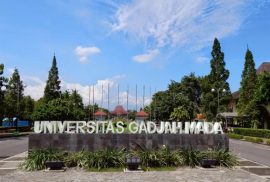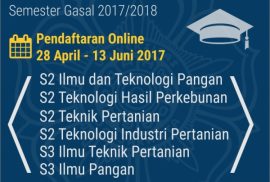The Faculty of Agricultural Technology held the third-year summer course on food with the theme of Local Indigenous Functional Food’s Roles in The Era of Covid19 Pandemic: From Farm to Table. The opening ceremony was held on July 13th, 2021. The first day of the Summer Course began with an opening ceremony filled with remarks from the Chief Executive of Summer Course, the Dean of the Faculty of Agricultural Technology, I Made Andi Arsana, ST, ME, Ph.D., the representative from the Office of International Affairs Universitas Gadjah Mada, and Prof. Dr. Ir. Djagal Wiseso Marseno, M.Agr, Vice-Rector for Education, Learning and Students Affairs at Universitas Gadjah Mada, Yogyakarta. There are participants from several countries including Belgium, Sweden, India, Japan, Malaysia, Thailand, Taiwan, Mexico, Vietnam, Poland, Germany, Saudi Arabia, Ecuador, Philippines, and Indonesia. There were about 100 participants attended approximately. Besides engaging in the lecture with the experts and group discussion with students from different countries, the participants will experience virtual field trips and community visits to Indonesian villages. This program will be held virtually from July 13th-23th 2021.
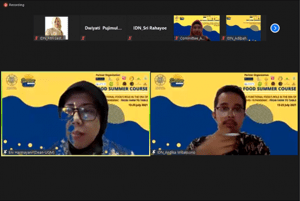 After the opening ceremony continued with 3 sessions of material delivered by Prof. Eni Harmayani, Prof. Unnikhrisnan, and Prof. Gerard Bodeker. The first session was delivered by Prof. Dr. Eni Harmayani, the Dean of Faculty of Agricultural Technology UGM with the topic “Functional Food Development of Local Resources”. In this section, Prof. Eni described the definition of functional food, why are foods called functional food, and functional food from Indonesia. Many local resources can be developed into functional food, such as Glucomannan from Porang, Mocaf from Cassava flour, sweet potato fiber, and Arrowroot flour. Indonesia also has Jamu (Indonesian herbal medicine) and Spices in Indonesia as a functional food.
After the opening ceremony continued with 3 sessions of material delivered by Prof. Eni Harmayani, Prof. Unnikhrisnan, and Prof. Gerard Bodeker. The first session was delivered by Prof. Dr. Eni Harmayani, the Dean of Faculty of Agricultural Technology UGM with the topic “Functional Food Development of Local Resources”. In this section, Prof. Eni described the definition of functional food, why are foods called functional food, and functional food from Indonesia. Many local resources can be developed into functional food, such as Glucomannan from Porang, Mocaf from Cassava flour, sweet potato fiber, and Arrowroot flour. Indonesia also has Jamu (Indonesian herbal medicine) and Spices in Indonesia as a functional food.
 In addition, the second session was given by Prof. Unnikhrisnan Payyapallimanna about Indigenous Food Systems in Promotion of Health – An Ayurvedic (Indian) Perspective. Prof. Unnikhrisnan discussed the sustainability challenges of non-communicable, lifestyle diseases, and malnutrition, links between Biodiversity, Nutrition, and Health and the role of traditional knowledge, and elaborated the traditional food systems, their significance in health and nutrition: An Ayurveda perspective. Other than that, Prof. Unnikhrisnan emphasized that “Diversity enriches the quality of life in health, sensory, social, intellectual, and moral terms and increases options and resilience for building livelihoods in the short term and for the future.”
In addition, the second session was given by Prof. Unnikhrisnan Payyapallimanna about Indigenous Food Systems in Promotion of Health – An Ayurvedic (Indian) Perspective. Prof. Unnikhrisnan discussed the sustainability challenges of non-communicable, lifestyle diseases, and malnutrition, links between Biodiversity, Nutrition, and Health and the role of traditional knowledge, and elaborated the traditional food systems, their significance in health and nutrition: An Ayurveda perspective. Other than that, Prof. Unnikhrisnan emphasized that “Diversity enriches the quality of life in health, sensory, social, intellectual, and moral terms and increases options and resilience for building livelihoods in the short term and for the future.”
Therefore, the third session was explained by Prof. Gerard Bodeker about The Role of Food as Medicine in Asian Traditional Health Systems. Prof. Gerard discussed the diet pattern that leads to non-communicable diseases. Prof. Gerard also discussed the food that has an inflammatory effect on our body, the comparison of the content of brown rice and white rice and their effects on the body, and the content of some foods that were associated with cognitive function and brain aging. Prof Gerry also discusses types of diet from any region including the Mediterranean diet, Japanese diet, Asian diets use Medicinal Herbs. Prof. Gerard mentioned that several Asian traditional diet sources that can be consumed during covid-19 pandemics are turmeric, pegagan, Tinospora cordifolia, and Carica papaya leaves. The current research found that Carica papaya leaves possibly become a treatment for Covid-19.

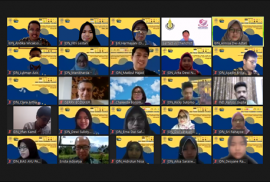
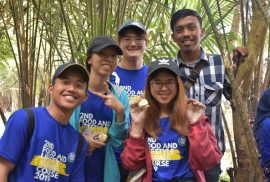
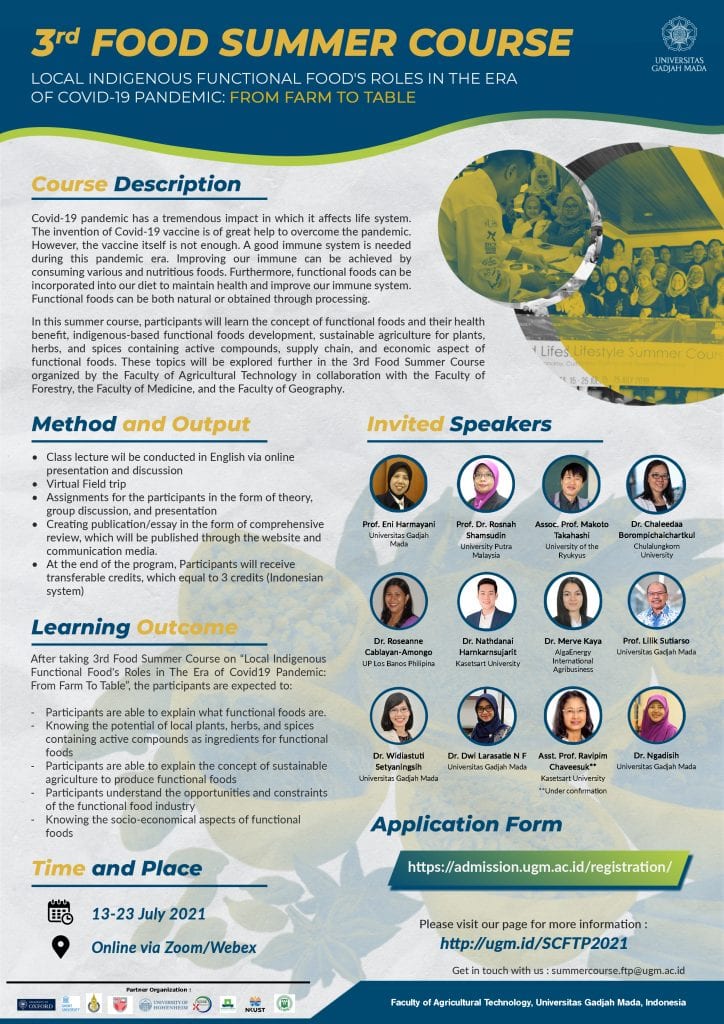
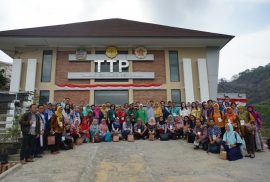

 The participants visited the Agricultural Technology Park (Taman Teknologi Pertanian) located in Gunung Kidul regency, at Nglanggeran village on 30th August 2018. The park was under the authority of Badan Pengkajian Teknologi Pertanian (BPTP) with the assistance from the Faculty of Agricultural Technology of Gadjah Mada University. Dr. Titiek D. Djafaar as BPTP staff presented the introduction of the park and researches held by UGM which were applied for the product development. A traditional performance of gejlok lesung exhibited during the lunch time by the locals also enlivens the impression of Nglanggeran village.
The participants visited the Agricultural Technology Park (Taman Teknologi Pertanian) located in Gunung Kidul regency, at Nglanggeran village on 30th August 2018. The park was under the authority of Badan Pengkajian Teknologi Pertanian (BPTP) with the assistance from the Faculty of Agricultural Technology of Gadjah Mada University. Dr. Titiek D. Djafaar as BPTP staff presented the introduction of the park and researches held by UGM which were applied for the product development. A traditional performance of gejlok lesung exhibited during the lunch time by the locals also enlivens the impression of Nglanggeran village. During the visit, the participants were able to watch the chocolate making process. The Nglanggeran Agricultural Technology Park processes cacao grown by the local people into chocolate candy, chocolate bar, and chocolate powder. Another differentiated products consist of cipiran cokelat, untir cokelat, sale salut cokelat, onde-onde cokelat, and another creative products. The park has an integrated system of the cacao processing by manufacturing the waste in the form of pulp of the cacao fruit to produce mineral blocks used as supplements for goat’s feed. The Etawa goat’s milk is then flavored by the chocolate and sold as chocolate milk powder. It can also be bought as original Etawa goat’s milk.
During the visit, the participants were able to watch the chocolate making process. The Nglanggeran Agricultural Technology Park processes cacao grown by the local people into chocolate candy, chocolate bar, and chocolate powder. Another differentiated products consist of cipiran cokelat, untir cokelat, sale salut cokelat, onde-onde cokelat, and another creative products. The park has an integrated system of the cacao processing by manufacturing the waste in the form of pulp of the cacao fruit to produce mineral blocks used as supplements for goat’s feed. The Etawa goat’s milk is then flavored by the chocolate and sold as chocolate milk powder. It can also be bought as original Etawa goat’s milk. Currently, a research about probiotic incorporation using milk as the carrier in chocolate candy is conducted at the park by several fourth-year students of Food and Agricultural Product Technology of UGM with the assistance of Dr. Ir. Tyas Utami, M.Sc and Prof. Dr. Ir. Endang Sutriswati Rahayu. A sensory test of the probiotic chocolate candy was also done with the participants as the panelists.
Currently, a research about probiotic incorporation using milk as the carrier in chocolate candy is conducted at the park by several fourth-year students of Food and Agricultural Product Technology of UGM with the assistance of Dr. Ir. Tyas Utami, M.Sc and Prof. Dr. Ir. Endang Sutriswati Rahayu. A sensory test of the probiotic chocolate candy was also done with the participants as the panelists.